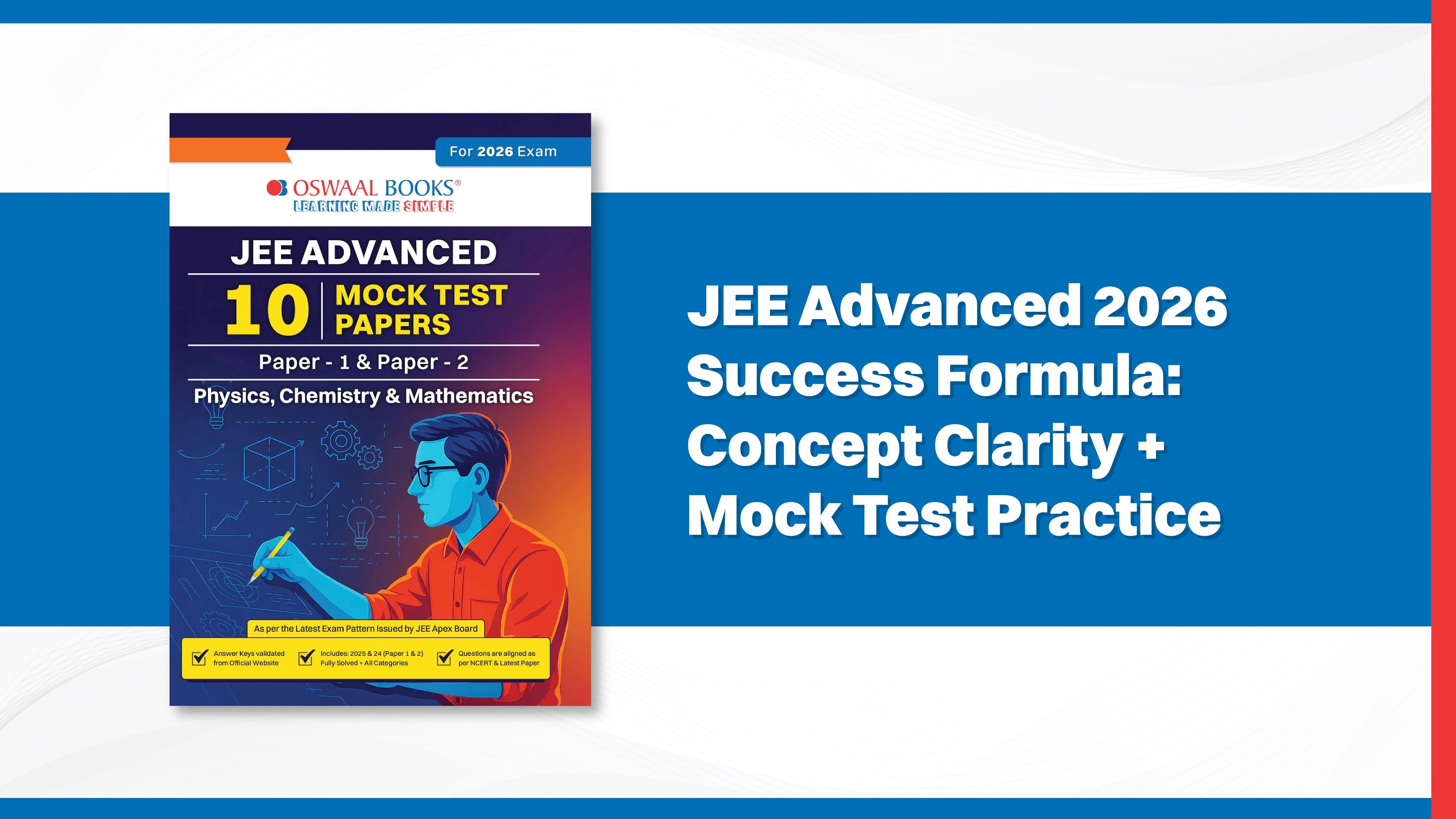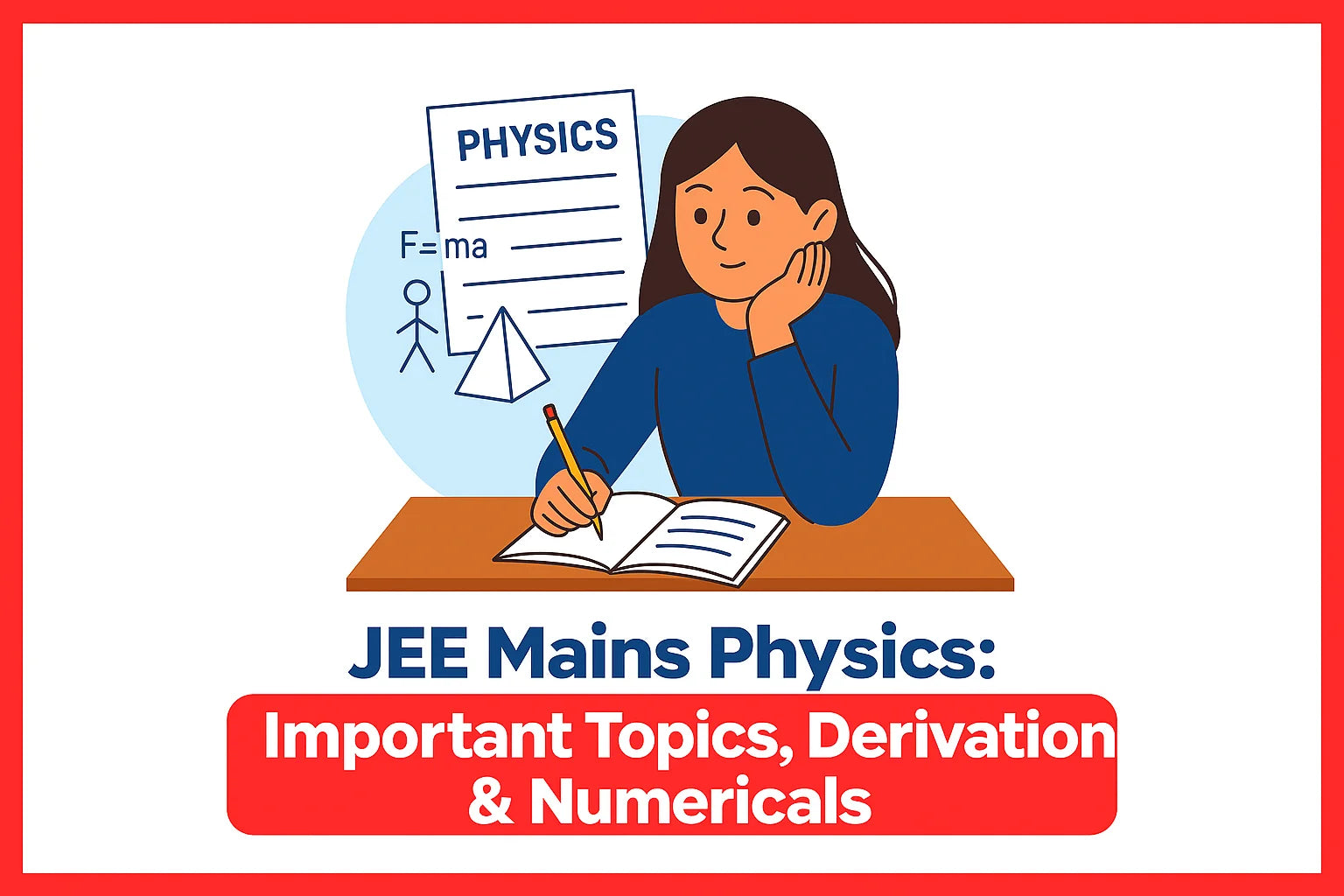Every IIT aspirant dreams of cracking JEE Advanced, and with lakhs of candidates competing to crack a limited number of seats, competition is cutthroat. The most intelligent thing to do to stay ahead is to concentrate on high-weightage chapters, which are common in the exam. By looking at the trend of the previous years and critically going through the JEE Advanced PYQ book and JEE Advanced question bank, one will have a clear idea of what to focus on.
In this blog, we have gone deep into the most significant chapters, subject-wise, in JEE Advanced 2026, on the basis of an in-depth trend analysis of the past 10 years. It also provides answers to some of the frequently asked questions in a detailed, paragraph format to provide you with clarity and direction.
High-Weightage Chapters for JEE Advanced 2026 – Subject-Wise Breakdown
|
Subject |
Chapter |
Approximate Weightage |
|
Physics |
Mechanics |
20–25% |
|
Current Electricity & Magnetism |
15–20% |
|
|
Modern Physics |
10–15% |
|
|
Optics |
10% |
|
|
Heat and Thermodynamics |
10–12% |
|
|
Chemistry |
Chemical Bonding & Molecular Structure |
12–15% |
|
Organic Chemistry – General Principles |
10–12% |
|
|
Electrochemistry |
8–10% |
|
|
Coordination Compounds |
10–12% |
|
|
Atomic Structure |
5–8% |
|
|
Mathematics |
Calculus |
30–35% |
|
Vectors & 3D Geometry |
10–12% |
|
|
Algebra (Complex Numbers, Matrices) |
10–12% |
|
|
Probability and Statistics |
5–8% |
|
|
Coordinate Geometry |
12–15% |
Why Focus on High-Weightage Chapters?
It is best to concentrate on chapters that have had the same weightage over the years to get the highest score within the shortest time. Students who carefully spend their time on such chapters score much higher in the examination. When you study a JEE Advanced PYQ book or JEE Advanced question bank, you will find that these chapters form almost 60-70 percent of the total marks.
When you master these areas, it does not imply that you should also forget the other areas; however, it provides you with a competitive advantage since you do not leave the commonly asked areas.
Read More: How to Crack JEE Advanced 2026 in First Attempt?
Subject-Wise Detailed Breakdown Based on Trends
Physics – Conceptual Understanding is Key
JEE Advanced physics is a combination of both conceptual understanding and numerical usage. To handle time and accuracy, you must have a good grasp of concepts and a lot of practice through the best mock tests of JEE Advanced.
Must-Focus Chapters:
-
Mechanics – This is the heart of Physics. Topics like Newton's Laws, Work-Energy, Rotational Motion, and Gravitation form the bulk of questions.
-
Current Electricity and Magnetism – High-scoring with predictable question types.
-
Thermodynamics & Heat Transfer – Has overlap with Chemistry, so double advantage.
-
Optics – Especially ray optics, lens systems, and wave optics.
-
Modern Physics – Questions are usually straightforward and carry good weight.
Chemistry – Memory + Application
The chemistry paper is the most scoring paper in JEE Advanced, provided it is approached in the right way. A combination of NCERT basics, conceptual soundness, and practice via the JEE Advanced question bank can get a good score.
Must-Focus Chapters:
-
Chemical Bonding – The backbone of Inorganic Chemistry.
-
Coordination Compounds – Frequently asked and high-scoring.
-
Organic Chemistry (Reaction Mechanism + Named Reactions) – Integral part with application-based questions.
-
Electrochemistry and Thermodynamics – Often paired in hybrid questions.
-
Atomic Structure and Periodic Table – Basics that can’t be ignored.
Mathematics – Practice is Everything
Maths is often the deal-breaker. Even if you're conceptually strong, lack of practice can cost you time and accuracy. Refer to the best mock tests for JEE Advanced to simulate real exam pressure and refine problem-solving speed.
Must-Focus Chapters:
-
Calculus – Undoubtedly the most important. Differentiation, Integration, Area under Curve, and Differential Equations dominate.
-
Algebra – Especially Matrices, Determinants, and Complex Numbers.
-
Vectors & 3D Geometry – Application-based and frequent.
-
Coordinate Geometry – Straight lines, circles, and conics are inevitable.
-
Probability & Statistics – Frequently asked and scoring if the basics are clear.
Year-Wise Trend of Important Topics (Based on PYQs)
|
Year |
Dominant Physics Topic |
Dominant Chemistry Topic |
Dominant Maths Topic |
|
2025 |
Mechanics |
Coordination Compounds |
Calculus |
|
2024 |
Modern Physics |
Electrochemistry |
Matrices & Determinants |
|
2023 |
Thermodynamics |
Organic Chemistry |
Vectors & 3D Geometry |
|
2022 |
Optics |
Chemical Bonding |
Calculus & Probability |
|
2021 |
Electromagnetism |
p-Block Elements |
Complex Numbers |
Which chapters are most important for JEE Advanced 2026 in Physics?
According to the trend analysis done in the JEE Advanced PYQ book and question banks, Mechanics, Electrodynamics (incl. Current Electricity and Magnetism), and Thermodynamics are the outstanding ones. The three of them can comprise over 50 percent of the Physics section. Other courses frequently repeated with medium-to-high difficulty levels are Optics and Modern Physics.
As an example, in the 2024 paper, nearly 6 of the 18 Physics questions were on Mechanics and Modern Physics together. To develop mastery, aspirants are supposed to revise theory and solve mixed-concept problems thoroughly.
Is Calculus so important in JEE Advanced Maths?
Yes, Calculus is perhaps the most significant part in the JEE Advanced Mathematics. Calculus takes the largest portion of questions year after year. Such topics as Limits, Continuity, Differentiability, Integration, and Differential Equations are not only crucial to the exam, but also to the first-year IIT coursework.
When you read the JEE Advanced PYQ book, you can find that in every year at least 5-6 questions in the Maths paper are either directly or indirectly connected to Calculus.
What are the best ways to use a JEE Advanced question bank?
A JEE Advanced question bank can be used best when it is strategic. Do not solve it linearly, but rather split it into chapters and then solve questions after finishing each topic. Attention should be paid to medium-to-hard questions resembling the exam pattern.
In addition, compare your solution with the given solutions. This assists in streamlining your actions and acquiring alternative procedures. It is even possible to run full simulations with question banks together with the finest mock tests of JEE Advanced.
How often do high-weightage chapters repeat in JEE Advanced?
Very frequently. Although JEE Advanced is unpredictable, there are some patterns that it follows in terms of topic weightage. As an example, Mechanics in Physics, Calculus in Maths, and Coordination Chemistry in Chemistry have been dominant in nearly all papers in the past decade.
This consistency proves that trend-based preparation using the JEE Advanced PYQ book and mock tests is highly effective. Smart preparation involves identifying these patterns and practicing accordingly.
Is it okay to skip low-weightage chapters if I focus only on high-weightage ones?
It depends on your preparation level. If you're aiming for a rank below 1000, you cannot afford to leave any topic. However, if your focus is on qualifying or scoring well, you can prioritize high-weightage chapters.
That said, low-weightage chapters often contain easier questions. A balanced approach is to first complete high-weightage chapters thoroughly and then spend the last month revising the rest using concise notes and targeted mock tests.
Tips to Tackle High-Weightage Chapters Smartly
-
Divide chapters week-wise and solve topic-specific problems.
-
Focus on concept application – not just rote memorization.
-
Revise high-weightage topics multiple times.
-
Use the best mock tests for JEE Advanced to simulate test conditions.
-
Cross-reference with solutions in the JEE Advanced question bank to refine your approach.
Conclusion
Understanding high-weightage chapters and focusing on them smartly is a game-changer in JEE Advanced 2026 preparation. Analyzing trend data, solving questions from a reliable JEE Advanced PYQ book, practicing with a detailed JEE Advanced question bank, and taking the best mock tests for JEE Advanced will give you an edge over the competition.
Remember, while prioritization is key, consistency, discipline, and regular revision are what will help you clear the exam with flying colours. Stay focused, trust the process, and gear up with a smart study plan based on real data and trends.
Pro Tip: Stick to solving questions daily from high-weightage chapters and revise concepts weekly. Make a checklist of topics covered and analyze your performance using mock test scores.














